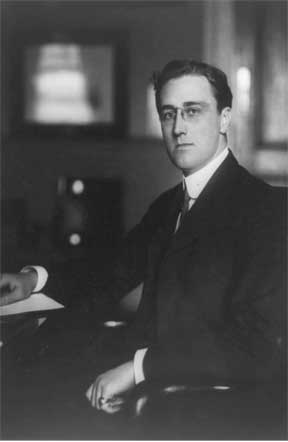FDR As Secretary of Navy

Secretary of Navy
Active support of the Wilson Presidential campaign resulted in Franklin's appointment as Assistant Secretary of the Navy. Franklin worked hard at the job and in the pre-war years established a reputation as a friend of the Navy and an efficient administrator. With the outbreak of World War I, Franklin became a strong supporter of preparedness and early American intervention. When the United States became involved in the war, he worked hard to increase the involvement of the navy.
Franklin Roosevelt went to Washington to attend the inauguration of President Wilson. On the morning of the inauguration Roosevelt ran into Josephus Daniels, the newly designated Secretary of the Navy. Roosevelt had turned down offers to be Assistant Secretary of Treasury or the Collector of the Port of New York. In the lobby of the Williard Hotel, Daniels asked Roosevelt if he wished to become his assistant. Roosevelt replied: "I'd like it bully well. It would please me better than anything in the world." For Roosevelt to be Secretary of the Navy was a natural. He had sailed since he was a little child, and all things regarding the Navy interested him greatly. It was also the same path that his cousin Teddy Roosevelt had taken to fame.
Roosevelt settled into the job which was a rather large one. The Navy was one of the largest federal agencies. It employed 65,000 men, both civilian and naval, and its annual budget was $150 million. Roosevelt enjoyed his job. He was primarily responsibile for contracts and civilian workers of the Navy. He was popular with Naval personnel and greatly enjoyed visiting ships. He had a special pennant designed for the Assistant Secretary of the Navy which was flown whenever he was on board. Roosevelt turned out to be an efficient administrator, successfully cutting through red tape and getting jobs done.
At the end of July 1914, World War I broke out in Europe. Roosevelt was immediately among those who pressed for greater readiness in the US armed forces. Roosevelt began to lobby for active American involvement in the war. Pressure rose for American involvement after German submarine attacks killed Americans. In February 1917, the United States intercepted the Zimmerman Telegram. This telegram from the German foreign minister to the German minister to Mexico, urged an alliance with Mexico in which the Mexicans would join the war and receive Texas back. Finally, Germany began unlimited submarine warfare against US vessels. This was too much for even the pacifists in the Wilson cabinet. On April 2, Congress was summoned by Wilson and war was declared on Germany.
With the United States now at war, Franklin worked actively to insure that the Navy had the largest possible role. His two pet projects were the building of small coastal boats, and a plan to mine the entrance of the North Sea, thus cutting off the access of German submarines to the ocean. Roosevelt worked hard to implement these plans. The first turned out unnecessary, and the second, while practical, reached completion too late to effect the war. In July 1918, Franklin went on a tour of the war front. As the highest ranking American to visit England since the US entry into the war, he was well received. He met with most of the British leadership, including King George V. Roosevelt went on to tour the battlefield in France. For nearly a month, he toured the battlefield extensively even coming under German artillery fire on one occassion. On his return he planned to resign and ask for a commission in the Navy, however, on the way back he became seriously ill with influenza. By the time he recovered, the war was ending. Franklin made another trip to Europe in 1919, to negotiate the termination of Navy contracts and the disposition of surplus Naval equipment in Europe.
 >
>